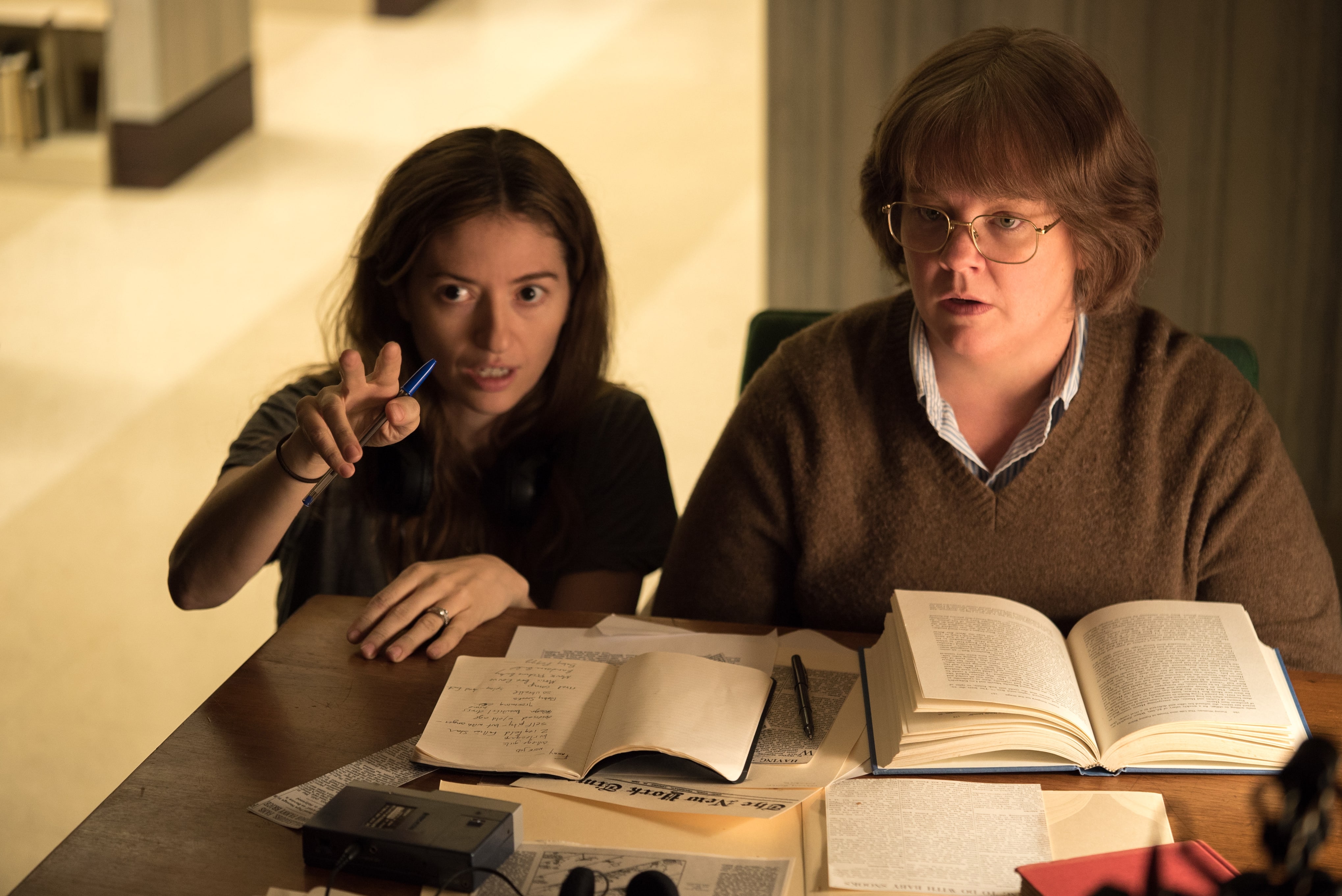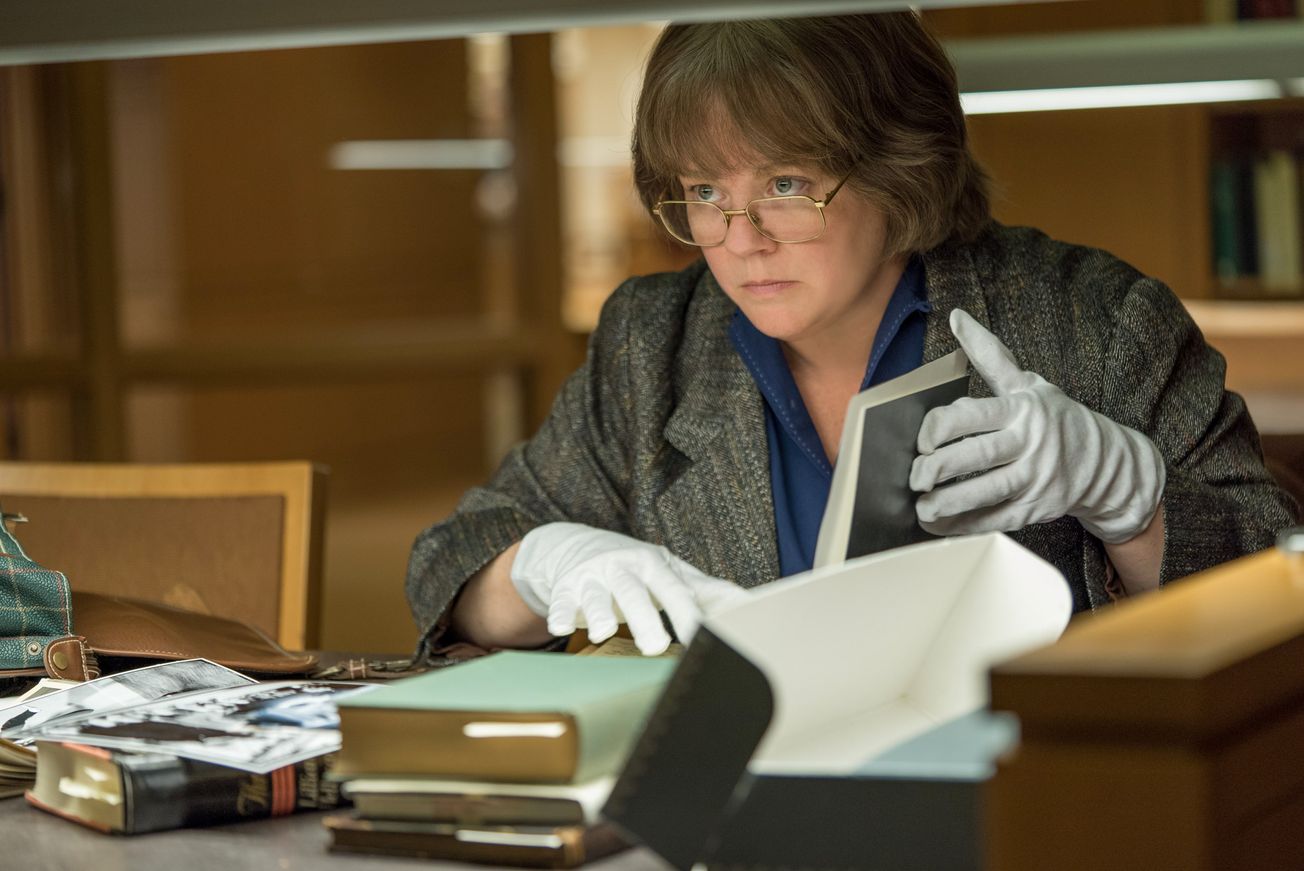By Miles Jackson, Student Film Correspondent
Melissa McCarthy and Richard E. Grant are receiving plaudits and nominations for their acting, but the film itself is bland and disappointing.
In Orson Welles’ documentary F for Fake (1973), cinema’s greatest artistic statement about forgery, Welles presents the true story of a biographer that made up details of the person he was writing about. Welles turns to the audience and describes his biographer as ‘a highly gifted writer. Does it say something about this age of ours that he could only make it big by fakery?’
It’s a question posited in Marielle Heller’s Can You Ever Forgive Me?, which tells the true story of Lee Israel, another biographer who turned to forging letters supposedly written by famous authors in order to pay the rent. Israel, delightfully played by Melissa McCarthy, is a clearly talented writer who naturally embodies the voices of those she memorialises even if the words themselves are fake. Yet McCarthy’s nuanced performance is undersold by a curious lack of vision from Heller and screenwriter Nicole Holofcener, who ironically fail to get into the head of a protagonist who is adept at just that.
Youtube / FoxSearchlight
Heller’s debut film The Diary of a Teenage Girl (2015) was a perceptive and sensitive ode to adolescence which also boasted a fabulous visual imagination, beautifully evoking the innermost desires of its protagonist through bold imagery. The same cannot be said for Can You Ever Forgive Me?, in which the washed-out, bland cinematography and flat, meaningless framing rarely say anything either about Israel or the world she inhabits.
There’s an implication in Holofcener’s screenplay that Israel’s forgery was not merely about paying her bills but rather gaining appreciation and recognition for her undeniable talent. Yet nothing in Heller’s lifeless direction ever reflects or dramatises such desires, leaving a film that features great performances and entertaining wisecracks but ultimately treats its subject superficially.
Heller’s wanting direction extends to the mechanics of the plot itself. The film fails to adequately build tension as the law inevitably catches up with Israel. A climactic heist sequence is shot entirely in close-ups and medium shots, with no sense of geography, scale or spatiality between Israel and the people she is stealing from, thus nulling any sense of tension. Likewise, there’s little sense of escalation as Israel’s crime spree expands, the screenplay never making the world around Israel feel tangible enough to measure any sense of change in her lifestyle or character as she profits from her fakery.

London Film Festival / Can You Ever Forgive Me?
It’s a shame as the film’s cast work together like gangbusters. McCarthy has always had a talent for finding an eminent likeability in life’s losers. Here, she turns a passive-aggressive, alcoholic cat lady into a lost, broken soul, grounding the character’s cynical, acerbic jibes in a bittersweet poignance. She’s matched by Richard E. Grant as Jack Hock, an irascible and foppish dandy who forms a strong bond with Israel, two cynics united by their self-destructive qualities. The film’s best moments are when the two actors are simply allowed to talk to each other, Holofcener’s witty dialogue elevated by two performers who find soul in the comedy.
Unfortunately, it’s not enough to hide the film’s inability to generate tension or develop Israel beyond a great performance and a few funny lines. Whilst the film’s cavalierness with which it treats both Israel and Hock’s homosexuality is admirable, Israel’s romance with a bookstore owner to whom she sells forged letters is a low-point of the film, neither character ever developing enough for the audience to feel any investment.
🎙 new podcast alert 🎙"When it started happening I thought it was happening to someone else....they've got the wrong name." @RichardEGrant chatted to me about Oscar nominations, Spice World and his fantastic new film Can You Ever Forgive Me. https://t.co/Tjc632pRa3 pic.twitter.com/qMvVlb3KNz
— Emma Gannon (@emmagannon) January 31, 2019
Whilst watching Can You Ever Forgive Me? I was reminded of television’s Better Call Saul (2015-), another story of an underappreciated talent turning to petty crime not only to achieve financial security but to vicariously gain recognition for their own smarts. Where that show regularly succeeds in cinematically depicting its protagonist’s ego and envy, as well as making crimes even more insignificant than the ones Israel commits feel earth-shattering, Marielle Heller’s sophomore feature simply fails to have the same impact. It’s a waste of a talented cast and a great story, as well as Heller’s own previously documented expertise.
Featured Image Credit: London Film Festival / Can You Ever Forgive Me?
Were you surprised by Melissa McCarthy's performance in the film?
Facebook // Epigram Film & TV // Twitter









